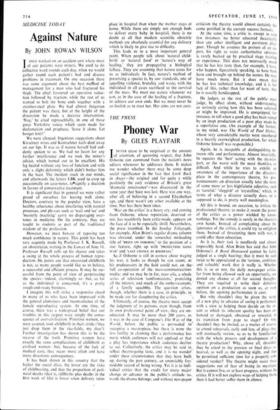Against Nature
By JOHN ROWAN WILSON
IONCE worked on an accident unit where most of our patients were miners. We used to do collective ward rounds each day, when we would gather round each patient's bed and discuss problems in treatment. On one occasion there was some argument about the best mettod of management for a man who had fractured his thigh. The chief favoured an operative reduc- tion followed by traction, while the rest of us wanted to bolt the bone ends together with a stainless-steel plate. We had almost forgotten the patient was there, but at the height of the discussion he made a decisive intervention. 'Nay,' he cried reproachfully, in one of those great Yorkshire voices which seem made for declamation and prophecy, 'leave it alone. Let booger knit!'
We were silenced. Ingenious suggestions about Kirschner wires and Kuntschner nails died away on our lips. It was as if nature herself had sud- denly spoken to us. We had no heart for any further interference and we took the miner's advice, which turned out to be excellent. His leg healed without any loss of function and with only a slight deformity which didn't bother him in the least. The incident stuck in our minds, and afterwards the letters LBK used to crop tip occasionally on case-notes, tossignify a decision in favour of conservative treatment.
It is significant that in general we were rather proud of ourselves for leaving well alone. Doctors, contrary to the popular, view, have a healthy reluctance about interfering with natural processes, and phtases such as 'wait and see' and 'masterly inactivity' carry no disparaging over- tones in medicine. On the contrary, they are taught to students as part of the traditional wisdom of the profession.
However, we must beware of reposing too much confidence in nature. This point has been very cogently made by Professor J. K. Russell, an obstetrician, writing in the Lancet of June 11. Professor Russell rolls up his sleeves and takes a swing at the whole process of human repro- duction. He points out that unassisted childbirth is not, as many people would like us to believe, a successful and efficient process. It may be suc- cessful from the point of view of perpetuating the species—indeed, alarmingly so—but, so far as the individual is concerned, it's a pretty rough-and-ready business.
I imagine this will strike a responsive chord in many of us -who have been impressed with the general clumsiness and inconvenience of the female reproductive system. At one time, of course, there was a widespread belief that our troubles in this respect were simply the conse- quence of over-civilisation. Primitive women, we were assured, took childbirth in their stride ('they Just drop them in the rice-fields, my dear). Further investigation has shown this to be the reverse of the truth. Primitive women have exactly the same complications of childbirth as civilised women--but, because of the lack of medical care, they occur more often and have more disastrous consequences.
It has been shown in this country that the higher the social class, the lower are the risks of childbearing, and that the proportion of pen- natal deaths (that is, stillbirths plus deaths in the first week of life) is lower when delivery takes
place in hospital than when the mother stays at home. While there are simply not enough beds to deliver every baby in hospital, there is no doubt at all that modern scientific obstetric methods are absolutely essential for any delivery which is likely to give rise to difficulty.
This leads us to a most important general point. When people talk about 'natural child- birth' or 'natural food' or 'nature's way of healing,' they are propagating a biological fallacy. They are assuming that nature cares for us as individuals. In fact, nature's method of preserving a species is, by our standards, one of appalling violence, brutality and waste, with the individual in all cases sacrificed to the survival of the mass. We must use nature whenever we can, as in the case of the healing of a fracture, to achieve our own ends. But we must never be so foolish as to trust her. Her aims are not ours.






























 Previous page
Previous page